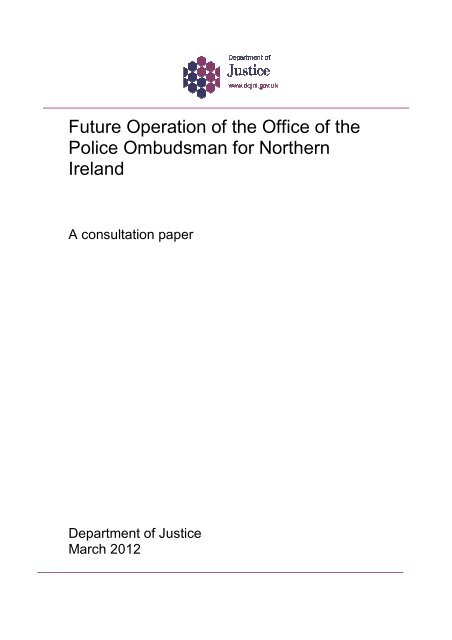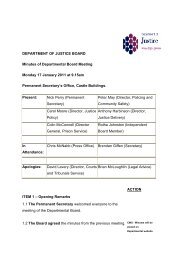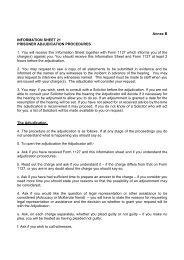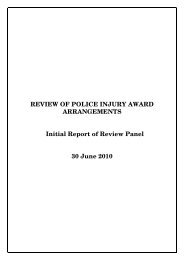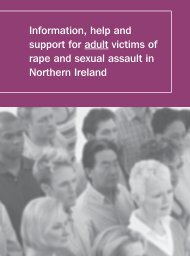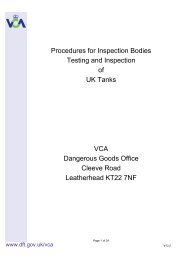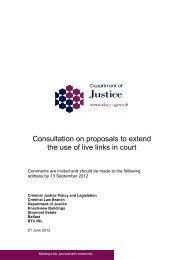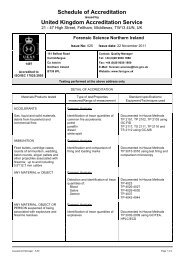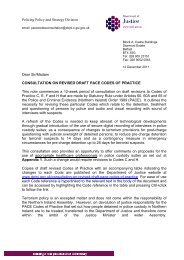Future Operation of the Office of the Police Ombudsman for Northern ...
Future Operation of the Office of the Police Ombudsman for Northern ...
Future Operation of the Office of the Police Ombudsman for Northern ...
You also want an ePaper? Increase the reach of your titles
YUMPU automatically turns print PDFs into web optimized ePapers that Google loves.
<strong>Future</strong> <strong>Operation</strong> <strong>of</strong> <strong>the</strong> <strong>Office</strong> <strong>of</strong> <strong>the</strong><strong>Police</strong> <strong>Ombudsman</strong> <strong>for</strong> Nor<strong>the</strong>rnIrelandA consultation paperDepartment <strong>of</strong> JusticeMarch 2012
ContentsPage NumberMinisterial Foreword 3Introduction 4Background 8International Human Rights Standards 14Approaches in Neighbouring Jurisdictions 16Discussion on Re<strong>for</strong>m 20Corporation Sole 24Justice <strong>Ombudsman</strong>/<strong>Office</strong> <strong>of</strong> JusticeOmbudsmen28Questions to Consider 31Fur<strong>the</strong>r In<strong>for</strong>mation:-Alternative Formats 33Confidentiality and Access to In<strong>for</strong>mationLegislation33Equality Statement 342
Ministerial <strong>for</strong>ewordAn important part <strong>of</strong> public confidence in justice and policing is confidence in<strong>the</strong> arrangements <strong>for</strong> investigating complaints against <strong>the</strong> police. People want<strong>the</strong> assurance <strong>of</strong> a system which is fair, objective and effective; that is astransparent as possible; and that takes proper account <strong>of</strong> <strong>the</strong> needs <strong>of</strong>victims.The findings <strong>of</strong> external and internal reports into <strong>the</strong> <strong>Office</strong> over recent monthsare such that public confidence has been damaged in respect <strong>of</strong> <strong>the</strong>adequacy <strong>of</strong> processes, robustness <strong>of</strong> report conclusions particularly inrespect <strong>of</strong> historic cases and have raised concerns regarding governance andhow <strong>the</strong> <strong>of</strong>fice is currently organised. Questions <strong>of</strong> confidence have arisenpreviously as well, and <strong>the</strong>re are differing views on <strong>the</strong> most appropriatepolice oversight mechanism that should be put in place to secure widespreadpublic confidence.This discussion paper and <strong>the</strong> <strong>Police</strong> <strong>Ombudsman</strong>’s Five-Year Review Reporton <strong>the</strong> working <strong>of</strong> Part VII <strong>of</strong> <strong>the</strong> <strong>Police</strong> (Nor<strong>the</strong>rn Ireland) Act 1998 (Part VIIcontains <strong>the</strong> legislative provisions governing complaints against <strong>the</strong> police)look at <strong>the</strong> legislative framework and governance arrangements <strong>for</strong> <strong>the</strong> <strong>Office</strong><strong>of</strong> <strong>the</strong> <strong>Police</strong> <strong>Ombudsman</strong> <strong>for</strong> Nor<strong>the</strong>rn Ireland. They set out options andinvite views on <strong>the</strong> appropriate way <strong>for</strong>ward.I am keen to agree a package <strong>of</strong> re<strong>for</strong>ms to restore public confidence in <strong>the</strong>work <strong>of</strong> <strong>the</strong> <strong>Office</strong> <strong>of</strong> <strong>the</strong> <strong>Police</strong> <strong>Ombudsman</strong> <strong>for</strong> Nor<strong>the</strong>rn Ireland (OPONI). Ofprimary importance to me will be to ensure OPONI will fulfil its functions with<strong>the</strong> confidence <strong>of</strong> <strong>the</strong> public.I look <strong>for</strong>ward to carefully considering all views received and will bring <strong>for</strong>wardrecommendations in light <strong>of</strong> <strong>the</strong>m.DAVID FORD MLAMinister <strong>of</strong> Justice3
1. Introduction1.1 In light <strong>of</strong> <strong>the</strong> recent focus on <strong>the</strong> <strong>Office</strong> <strong>of</strong> <strong>the</strong> <strong>Police</strong> <strong>Ombudsman</strong> <strong>for</strong>Nor<strong>the</strong>rn Ireland (OPONI), and a series <strong>of</strong> reports reviewing variousaspects <strong>of</strong> its operation, <strong>the</strong> discussion paper examines key issueswhich have emerged as important considerations about how OPONIshould operate in <strong>the</strong> future. This discussion paper is also timely as, afterover 10 years <strong>of</strong> <strong>the</strong> <strong>Ombudsman</strong>’s <strong>of</strong>fice and after <strong>the</strong> devolution <strong>of</strong>justice, it is right to look again at <strong>the</strong> arrangements and to considerwhe<strong>the</strong>r any changes to <strong>the</strong> structure are needed to secure widespreadpublic confidence and to consider changes or plans in o<strong>the</strong>r jurisdictions.1.2 This paper is intended as a springboard <strong>for</strong> discussion; <strong>the</strong> Minister <strong>of</strong>Justice is clear that <strong>the</strong> <strong>Ombudsman</strong>’s <strong>Office</strong> must continue to providerobust, independent oversight <strong>of</strong> <strong>the</strong> police which meets <strong>the</strong> needs <strong>of</strong>Nor<strong>the</strong>rn Ireland, but is keen to hear views from interested parties abouthow best to secure that objective and to ensure we have a detailedoperating model <strong>for</strong> future working to deliver better value and increasepublic confidence. It is important to stress that this consultation will notaffect <strong>the</strong> appointment <strong>of</strong> a new <strong>Ombudsman</strong>, but ra<strong>the</strong>r seeks toexplore options <strong>for</strong> longer term change.1.3 OPONI has occupied a critical place in <strong>the</strong> policing architecture inNor<strong>the</strong>rn Ireland. There is a responsibility to engender and preservetrust in this vital public service, as a lack <strong>of</strong> confidence risks undermining<strong>the</strong> independence and credibility <strong>of</strong> <strong>the</strong> <strong>Ombudsman</strong>. Ultimately thiscould undermine confidence in <strong>the</strong> police service overall.1.4 Given <strong>the</strong> historical context <strong>of</strong> <strong>the</strong> <strong>Ombudsman</strong>’s <strong>Office</strong>, and its value tosociety, any change will need to increase <strong>the</strong> organisation’s status andeffectiveness, and not diminish its ability to fulfil its role and secure publicconfidence.4
1.5 International models <strong>of</strong> civilian oversight agencies have varying degrees<strong>of</strong> independence and scale <strong>of</strong> mandate; OPONI is at <strong>the</strong> more robustend <strong>of</strong> <strong>the</strong> spectrum. A discussion needs to take place on whe<strong>the</strong>r thosearrangements require some amendment or bolstering or whe<strong>the</strong>r morefundamental change is appropriate.1.6 Confidence in <strong>the</strong> police, <strong>the</strong> confidence to complain when things gowrong, (and confidence by <strong>the</strong> police that <strong>the</strong>y will be treated fairly wheninvestigated) are factors critical <strong>for</strong> societal well being. The purpose <strong>of</strong>this paper is to test whe<strong>the</strong>r <strong>the</strong>re is room <strong>for</strong> more to be done inpractical terms to ensure that those principles are protected.1.7 Specifically <strong>the</strong> issues covered by this paper are:it is appropriate that <strong>the</strong> <strong>Ombudsman</strong> can have a policingbackground. Whe<strong>the</strong>r<strong>the</strong> corporation sole model, in o<strong>the</strong>r words, a singleindividual acting as <strong>Ombudsman</strong>, continues to be <strong>the</strong> mostappropriate.<strong>the</strong> functions <strong>of</strong> <strong>the</strong> <strong>Police</strong> <strong>Ombudsman</strong> could be located aspart <strong>of</strong> a Justice <strong>Ombudsman</strong>, Justice Ombudsmen, publicsector <strong>Ombudsman</strong>, or remain as a stand-alone <strong>of</strong>fice. Whe<strong>the</strong>r<strong>the</strong> proposals <strong>for</strong> adjustments to <strong>the</strong> role and powers <strong>of</strong> <strong>the</strong><strong>Ombudsman</strong> emerging from <strong>the</strong> five year review are appropriate.Whe<strong>the</strong>r1.8 The Minister <strong>of</strong> Justice has made it clear that all options are open,including those requiring legislative change and encourages views on<strong>the</strong> range <strong>of</strong> matters covered in <strong>the</strong> paper.1.9 He acknowledges that at <strong>the</strong> heart <strong>of</strong> <strong>the</strong> problems currently facingOPONI is <strong>the</strong> difficulty that <strong>the</strong> <strong>Ombudsman</strong> has in investigating historic5 Whe<strong>the</strong>r
cases which cannot be addressed by HET because <strong>of</strong> <strong>the</strong> direct orindirect involvement – real or alleged – <strong>of</strong> police <strong>of</strong>ficers. There needs tobe a strategic solution to dealing with <strong>the</strong> Past – not just a justicesolution. That would release <strong>the</strong> <strong>Ombudsman</strong>’s <strong>of</strong>fice from looking intopast events so that <strong>the</strong>y can concentrate on addressing currentcomplaints against <strong>the</strong> police.1.10 However, <strong>the</strong> issue <strong>of</strong> whe<strong>the</strong>r OPONI should continue to deal withhistoric cases involving police actions is part <strong>of</strong> a broader debate on <strong>the</strong>past. At present <strong>the</strong>re is no political consensus on how to addresslegacy issues and a range <strong>of</strong> opinions on <strong>the</strong> most appropriatemechanism <strong>for</strong> investigating historic cases. Until a successororganisation or mechanism is established to take <strong>for</strong>ward <strong>the</strong>investigation <strong>of</strong> historic cases, <strong>the</strong>re is an Article 2 duty on <strong>the</strong> Executiveto ensure <strong>the</strong>re are proper investigations in respect <strong>of</strong> cases where <strong>the</strong>rehas been a loss <strong>of</strong> life. As such, OPONI will continue to investigate<strong>the</strong>se cases until an alternative is put in place. However this is anopportunity <strong>for</strong> you to give your views as to whe<strong>the</strong>r or how analternative should be put in place.Q: Do you believe an alternative mechanism <strong>for</strong> investigatinghistoric cases should be put in place? If so what <strong>for</strong>m should thattake?1.11 The current <strong>Ombudsman</strong> will leave <strong>of</strong>fice be<strong>for</strong>e his term <strong>of</strong> <strong>of</strong>fice comesto an end, whilst recognising <strong>the</strong> importance <strong>of</strong> having a fully functioning<strong>Office</strong> <strong>of</strong> <strong>the</strong> <strong>Ombudsman</strong> at all times. To this end he has appointed aninterim Chief Executive and <strong>for</strong>mally delegated his functions as <strong>Police</strong><strong>Ombudsman</strong> to appropriate levels within his <strong>Office</strong> with effect frommidnight on 28 January 2012. The First Minister and deputy FirstMinister are responsible <strong>for</strong> <strong>the</strong> process to recommend a new <strong>Police</strong><strong>Ombudsman</strong> and <strong>the</strong> recruitment process is currently ongoing. Thispaper seeks to address issues <strong>for</strong> <strong>the</strong> longer term – it is clear <strong>the</strong> new6
<strong>Ombudsman</strong> will be appointed under <strong>the</strong> current legislativearrangements.7
2. Background2.1 In November 1995 Dr Maurice Hayes produced proposals <strong>for</strong> a newpolice complaints system <strong>for</strong> Nor<strong>the</strong>rn Ireland designed to secure <strong>the</strong>confidence <strong>of</strong> <strong>the</strong> people <strong>of</strong> Nor<strong>the</strong>rn Ireland, and <strong>of</strong> <strong>the</strong> police<strong>the</strong>mselves.2.2 Dr Hayes published his report in January 1997, following a consultationwith political parties, members <strong>of</strong> <strong>the</strong> public, <strong>the</strong> police and policingorganisations. In <strong>the</strong> report Dr Hayes stated that "<strong>the</strong> overwhelmingmessage I got from nearly all sides and from all political parties was <strong>the</strong>need <strong>for</strong> <strong>the</strong> investigation to be independent and to be seen to beindependent".2.3 His key recommendation was that an independent <strong>Police</strong> <strong>Ombudsman</strong>should be appointed to deal with all complaints against <strong>the</strong> police. The<strong>Ombudsman</strong> should be supported by a team <strong>of</strong> pr<strong>of</strong>essionalinvestigators which he envisaged being drawn from a range <strong>of</strong>disciplines, including <strong>the</strong> police. Dr Hayes recommended that <strong>the</strong><strong>Ombudsman</strong> be a full time post, filled by a judge or a person <strong>of</strong> <strong>the</strong>quality and experience <strong>of</strong> a senior judicial figure.2.4 The Belfast Agreement addressed <strong>the</strong> concept <strong>of</strong> oversight <strong>of</strong> <strong>the</strong> police,saying that <strong>the</strong> Commission on Policing should include proposalsdesigned to ensure that <strong>the</strong>re would be an “open, accessible andindependent means <strong>of</strong> investigating and adjudicating upon complaintsagainst <strong>the</strong> police.”2.5 The Patten Report was explicit in its full support <strong>for</strong> <strong>the</strong> Hayes report,and concurred that a fully independent <strong>Police</strong> <strong>Ombudsman</strong> was required<strong>for</strong> Nor<strong>the</strong>rn Ireland. Patten made a number <strong>of</strong> recommendations inrelation to <strong>the</strong> <strong>Ombudsman</strong>, stating:8
“We cannot emphasise too strongly <strong>the</strong> importance <strong>of</strong> <strong>the</strong> <strong>of</strong>fice <strong>of</strong> <strong>Police</strong><strong>Ombudsman</strong> in <strong>the</strong> future policing arrangements…<strong>the</strong> institution iscritical to <strong>the</strong> question <strong>of</strong> police accountability to <strong>the</strong> law, to public trust in<strong>the</strong> police and to <strong>the</strong> protection <strong>of</strong> human rights”.Legislative Base2.6 Legislation creating <strong>the</strong> <strong>Police</strong> <strong>Ombudsman</strong> was brought <strong>for</strong>ward as part<strong>of</strong> <strong>the</strong> <strong>Police</strong> (Nor<strong>the</strong>rn Ireland) Act 1998 which set out <strong>the</strong> powers andfunctions <strong>of</strong> <strong>the</strong> <strong>Office</strong>, creating a legislative framework <strong>for</strong> independentoversight <strong>of</strong> <strong>the</strong> police. While described as a <strong>Police</strong> “<strong>Ombudsman</strong>”,OPONI could perhaps be more accurately described as a civilian bodywith responsibility <strong>for</strong> oversight <strong>of</strong> <strong>the</strong> <strong>Police</strong> Service <strong>of</strong> Nor<strong>the</strong>rn Ireland.2.7 The <strong>Office</strong> began operating on 6 November 2000, when Nuala O’Loantook up <strong>of</strong>fice as <strong>the</strong> first <strong>Police</strong> <strong>Ombudsman</strong>. Baroness O’Loan’s term<strong>of</strong> <strong>of</strong>fice ended in 2007, and she was succeeded by <strong>the</strong> currentincumbent, Al Hutchinson, <strong>the</strong> <strong>for</strong>mer <strong>Police</strong> Oversight Commissionerand previously an <strong>of</strong>ficer in <strong>the</strong> RCMP.2.8 The <strong>Police</strong> <strong>Ombudsman</strong> is appointed by The Queen, upon arecommendation made by <strong>the</strong> First Minister and deputy First Minister, asa named person <strong>for</strong> a fixed term <strong>of</strong> seven years. While this is longerthan <strong>the</strong> usual term <strong>for</strong> public appointments, it reflects <strong>the</strong> practice <strong>for</strong>o<strong>the</strong>r <strong>Ombudsman</strong> appointments and is intended to underscore <strong>the</strong> need<strong>for</strong> <strong>the</strong> post to be free from political interference. The post holder is paidusing judicial salary scales.2.9 The First Minister and deputy First Minister acting jointly may call upon<strong>the</strong> <strong>Ombudsman</strong> to retire in <strong>the</strong> interests <strong>of</strong> efficiency and effectiveness;or if satisfied that <strong>the</strong> <strong>Ombudsman</strong> has been convicted <strong>of</strong> a criminal<strong>of</strong>fence or become bankrupt.2.10 The <strong>Police</strong> <strong>Ombudsman</strong> investigates all complaints made about PSNI,from incivility to criminal conduct.9
2.11 The functions <strong>of</strong> <strong>the</strong> <strong>of</strong>fice were extended to include retrospectivematters, by <strong>the</strong> RUC (Complaints etc) Regulations 2001. The <strong>Police</strong><strong>Ombudsman</strong> has exclusive jurisdiction <strong>for</strong> cases where a death hasresulted from <strong>the</strong> conduct <strong>of</strong> a police <strong>of</strong>ficer which precludes <strong>the</strong>involvement <strong>of</strong> <strong>the</strong> PSNI, including HET in such investigations. Inreviewing all deaths arising from <strong>the</strong> ‘Troubles’ in Nor<strong>the</strong>rn Ireland, HETmust refer any matter in which <strong>the</strong> conduct <strong>of</strong> a police <strong>of</strong>ficer may haveresulted in <strong>the</strong> death <strong>of</strong> ano<strong>the</strong>r person or in which potential criminality orserious misconduct by police <strong>of</strong>ficers is observed or is subject <strong>of</strong>complaint.Status2.12 Like <strong>the</strong> Director <strong>of</strong> Public Prosecutions, <strong>the</strong> status <strong>of</strong> this authority isthat <strong>of</strong> corporation sole. However, unlike this post, <strong>the</strong> legislationestablishing <strong>the</strong> <strong>Police</strong> <strong>Ombudsman</strong> does not provide <strong>for</strong> an interim<strong>Ombudsman</strong> to exercise powers and this appears to be an oversightwhich needs to be rectified.Q: Do you agree that <strong>the</strong>re should be a provision to authorise aperson to act as interim <strong>Ombudsman</strong> whilst a permanentappointment is made by <strong>the</strong> First Minister and deputy First Ministeracting jointly?2.13 The status <strong>of</strong> <strong>the</strong> <strong>Office</strong> <strong>of</strong> <strong>the</strong> <strong>Police</strong> <strong>Ombudsman</strong> is that <strong>of</strong> a nondepartmentalpublic body (NDPB) sponsored through <strong>the</strong> Department <strong>of</strong>Justice. This means that it is subject to DFP guidance in relation to itsgovernance, but not in respect <strong>of</strong> its executive functions. In short, <strong>the</strong>DOJ’s Accounting <strong>Office</strong>r (<strong>the</strong> Permanent Secretary) is accountable to<strong>the</strong> Minister and <strong>the</strong> Assembly <strong>for</strong> how <strong>the</strong> organisation manages publicmoney and its corporate risks.10
2.14 The investigative functions <strong>of</strong> <strong>the</strong> organisation operate independently <strong>of</strong>Government. It is an important principle that government should not beable to determine which cases are investigated, how <strong>the</strong>y areinvestigated or what <strong>the</strong> outcome should be. None<strong>the</strong>less, recentcontroversy has demonstrated <strong>the</strong> need <strong>for</strong> public confidence in <strong>the</strong>effectiveness <strong>of</strong> investigations conducted by OPONI. CJINI can examineaspects <strong>of</strong> this but are not empowered to consider <strong>the</strong> efficacy <strong>of</strong> <strong>the</strong>investigation <strong>of</strong> individual cases. Individual decisions can be challengedthrough <strong>the</strong> courts. There remains a question as to whe<strong>the</strong>r <strong>the</strong>reshould be a separate appeal mechanism <strong>for</strong> <strong>Ombudsman</strong> decisions.Q: Do you believe <strong>the</strong>re needs to be a mechanism to appealdecisions <strong>of</strong> <strong>the</strong> <strong>Ombudsman</strong>? If so what <strong>for</strong>m should that take?Recent History2.15 As a result <strong>of</strong> concerns raised by <strong>the</strong> <strong>the</strong>n Chief Executive <strong>of</strong> OPONI,two separate independent reviews were commissioned. The first wasconducted by Tony McCusker and addressed <strong>the</strong> relationship betweenOPONI and <strong>the</strong> DoJ and looked into claims <strong>of</strong> interference by DOJ<strong>of</strong>ficials. There were a number <strong>of</strong> issues which he found gave cause <strong>for</strong>concern. In particular, he was concerned that an agreement appearedto have been concluded on <strong>the</strong> previous five year review between <strong>the</strong>Senior Director <strong>of</strong> Investigations and a middle ranking <strong>of</strong>ficial <strong>of</strong> <strong>the</strong> NIOwithout ei<strong>the</strong>r <strong>the</strong> imprimatur <strong>of</strong> <strong>the</strong> <strong>Ombudsman</strong> or <strong>the</strong> knowledge <strong>of</strong> <strong>the</strong>Chief Executive. Also <strong>the</strong> question <strong>of</strong> <strong>the</strong> Senior Director <strong>of</strong>Investigations being party to a controversial note prepared by DFPconsultants which was <strong>the</strong>n referenced in a subsequent grievance casetaken against <strong>the</strong> Chief Executive, was raised as a serious cause <strong>for</strong>concern.2.16 As part <strong>of</strong> his response to <strong>the</strong> review report published in June 2011[<strong>Police</strong> <strong>Ombudsman</strong> Investigation Report | Department <strong>of</strong> Justice NI], <strong>the</strong>11
Minister <strong>of</strong> Justice announced his intention to bring <strong>for</strong>ward a discussionpaper on <strong>the</strong> future <strong>of</strong> <strong>the</strong> <strong>of</strong>fice.2.17 The second review was conducted by Criminal Justice InspectionNor<strong>the</strong>rn Ireland (CJINI) at <strong>the</strong> request <strong>of</strong> <strong>the</strong> <strong>Police</strong> <strong>Ombudsman</strong>following criticism <strong>of</strong> OPONI. The inspection looked at <strong>the</strong>independence <strong>of</strong> <strong>the</strong> <strong>Office</strong> <strong>of</strong> <strong>the</strong> <strong>Police</strong> <strong>Ombudsman</strong> from <strong>the</strong> PSNIbecause <strong>of</strong> concerns raised in relation to a lowering <strong>of</strong> <strong>the</strong> operationalindependence <strong>of</strong> OPONI. The inspection report, published in September2011 [http://www.cjini.org/TheInspections/Inspection-Reports.aspx],found <strong>the</strong> legislative framework to be sound, reporting that it provided astrong framework <strong>for</strong> <strong>the</strong> operational independence <strong>of</strong> a policecomplaints body.2.18 During <strong>the</strong> course <strong>of</strong> <strong>the</strong> inspection – with some exceptions – CJINI didnot hear any significant concerns over <strong>the</strong> way in which OPONI dealswith current cases. However, significant concerns were raised aroundhow historic cases are handled including an inconsistent investigationprocess, a varied approach to communication with stakeholders anddifferences in quality assurance. In addition, CJINI found a seniormanagement team divided around <strong>the</strong> production <strong>of</strong> historic reports anda fractured approach to governance and decision-making. The handling<strong>of</strong> sensitive material was also found to be problematic. On that basis, itwas agreed that <strong>the</strong> investigation <strong>of</strong> historic cases should be suspended(save where investigations have to proceed alongside existing PSNIinvestigations) until a revised investigation process and resourced planis in place which is capable <strong>of</strong> independent validation by CJINI.2.19 At this stage progress has been made in re<strong>for</strong>ming <strong>the</strong> processes tosupport <strong>the</strong> approval <strong>of</strong> <strong>the</strong> historic business case, but fur<strong>the</strong>r work isrequired in order to fully implement <strong>the</strong> report recommendations and thiswill take some fur<strong>the</strong>r time. Until CJINI is able to give <strong>the</strong> <strong>Office</strong> a cleanbill <strong>of</strong> health in respect <strong>of</strong> processes <strong>for</strong> historic cases, it would beinappropriate <strong>for</strong> <strong>the</strong> <strong>Ombudsman</strong> to lift <strong>the</strong> suspension <strong>of</strong> those cases.12
The Minister has made clear his commitment to ensuring that action istaken to ensure that <strong>the</strong> issues raised in <strong>the</strong> report are dealt with so thatpublic confidence in <strong>the</strong> <strong>Office</strong> <strong>of</strong> <strong>the</strong> <strong>Police</strong> <strong>Ombudsman</strong> is maintained.Content2.20 This paper sets out <strong>the</strong> context through <strong>the</strong> International Human Rightsstandards which should be applied to civilian oversight <strong>of</strong> <strong>the</strong> police, anda comparative analysis <strong>of</strong> <strong>the</strong> approaches in our neighbouringjurisdictions. It goes on to discuss <strong>the</strong> rationale and options <strong>for</strong> changeacross each <strong>of</strong> <strong>the</strong> three issues: policing background; <strong>the</strong> corporationsole model; and <strong>the</strong> potential <strong>for</strong> a justice ombudsman or ombudsmen. Itraises a range <strong>of</strong> issues on which a public discussion is needed in <strong>the</strong>context <strong>of</strong> <strong>the</strong> conclusions <strong>of</strong> <strong>the</strong> <strong>Ombudsman</strong>’s own five-year review <strong>of</strong>Part VII <strong>of</strong> <strong>the</strong> <strong>Police</strong> Act 1998.13
3. International Human Rights Standards3.1 The Council <strong>of</strong> Europe’s Commissioner <strong>for</strong> Human Rights, ThomasHammerberg, published his Opinion concerning independent andeffective determination <strong>of</strong> complaints against <strong>the</strong> police in 2009 (“TheOpinion”).3.2 The opinion sets out five ECHR effective police complaints principles:Independence.Adequacy.Promptness.Public Scrutiny.Victim Involvement.3.3 The Commissioner recommends that all member states should have anindependent police complaints body (IPCB) with responsibility <strong>for</strong> <strong>the</strong>oversight <strong>of</strong> all complaints. Though not prescriptive about <strong>the</strong> issuesconsidered in this paper, such as whe<strong>the</strong>r <strong>the</strong> most effective model is <strong>for</strong>a single person, or a Commission model, it is a useful referencedocument in terms <strong>of</strong> providing assurance that we are taking account <strong>of</strong><strong>the</strong> right issues.143.4 The Opinion states: “<strong>the</strong> constitutional arrangements and policingsystems, along with historical, political and cultural influences, prevailingin each member state will play a major part in determining <strong>the</strong>institutional arrangements <strong>for</strong> an IPCB.” There<strong>for</strong>e, while <strong>the</strong> principleprovide a strategic framework <strong>for</strong> any body, it remains appropriate <strong>for</strong> <strong>the</strong>exact detail on any specific oversight mechanism to be developedlocally.3.5 The Opinion is an independent and authoritative framework; <strong>the</strong>re<strong>for</strong>e, inconsidering this paper, you may wish to consider <strong>the</strong> principles identifiedand assess <strong>the</strong> extent to which <strong>the</strong> options set out here would meet
<strong>the</strong>m. Clearly <strong>the</strong> overarching priority <strong>for</strong> any re<strong>for</strong>m should be itssuitability and appropriateness <strong>for</strong> our historical, political and culturalcontext. Where appropriate, <strong>the</strong>re<strong>for</strong>e, references will be made to <strong>the</strong>Opinion, in <strong>the</strong> context <strong>of</strong> discussion on specific issues.15
4. Approaches in Neighbouring JurisdictionsEngland and Wales4.1 <strong>Police</strong> Complaints are considered by <strong>the</strong> Independent <strong>Police</strong> ComplaintsCommission (IPCC), which was created by <strong>the</strong> <strong>Police</strong> Re<strong>for</strong>m Act 2002,partially in response to <strong>the</strong> Stephen Lawrence Inquiry. The legislationprovides <strong>for</strong> <strong>the</strong> IPCC to be overseen by a Chair and no less than teno<strong>the</strong>r members, none <strong>of</strong> whom may have worked previously <strong>for</strong> a UKpolice <strong>for</strong>ce in any capacity. Each Commissioner has responsibility <strong>for</strong> anumber <strong>of</strong> <strong>for</strong>ces. There are currently ten Commissioners in post, and<strong>the</strong> role <strong>of</strong> Chair is vacant – plans are <strong>for</strong> <strong>the</strong> next Chair to be appointedon a part-time basis. A legislative change is currently being consideredto reduce <strong>the</strong> number <strong>of</strong> commissioners to five.4.2 The IPCC does not investigate all complaints against <strong>the</strong> police but itcan review how <strong>the</strong> police handled complaints about <strong>the</strong> conduct <strong>of</strong><strong>of</strong>ficers, and it can investigate more serious matters, includingallegations <strong>of</strong> criminal behaviour by police <strong>of</strong>ficers.o Death or serious injuryo Serious assaulto Serious sexual assaulto Serious corruptiono Criminal Offence or behaviour which is liable to lead to adisciplinary sanction and which, in ei<strong>the</strong>r case, is aggravatedby discriminatory behaviour.The IPCC can also call in matters which it considers to be serious orcould impact on public confidence. There is also a facility <strong>for</strong> <strong>for</strong>ces tovoluntarily refer matters where <strong>the</strong>y consider independent oversight to berequired.16
4.3 In 2010/11 <strong>the</strong> IPCC received 2,401 referrals from <strong>the</strong> police, <strong>of</strong> which2,092 were returned to <strong>the</strong> police <strong>for</strong> local investigation or localresolution. The IPCC’s budget is currently £34.3 m, and will be reducingover <strong>the</strong> next three years in line with <strong>the</strong> reduction in Governmentspending.4.4 The IPCC’s governance arrangements are as an Arms Length Body <strong>of</strong><strong>the</strong> Home <strong>Office</strong>.Ireland4.5 The Garda Síochána <strong>Ombudsman</strong> Commission (GSOC) provides civilianoversight <strong>of</strong> <strong>the</strong> police in <strong>the</strong> Republic <strong>of</strong> Ireland, and was established by<strong>the</strong> Garda Síochána Act 2005. The GSOC consists <strong>of</strong> three members,one <strong>of</strong> whom is appointed as Chair. At least one Commissioner must befemale, and at least one must be male. Where agreement cannot bereached on an issue, <strong>the</strong> legislation provides <strong>for</strong> determination to bereached through a majority vote. Although not specified in legislation, inpractice <strong>the</strong> Chair takes responsibility <strong>for</strong> <strong>the</strong> overall leadership andmanagement <strong>of</strong> <strong>the</strong> organisation. Commissioners cannot have servedas a member <strong>of</strong> An Garda Síochána although one member has apolicing background as a <strong>for</strong>mer member <strong>of</strong> <strong>the</strong> Metropolitan <strong>Police</strong>.4.6 GSOC can investigate all complaints about <strong>the</strong> Garda, although wherepossible it will seek to resolve complaints through in<strong>for</strong>mal resolution ormediation. A large proportion <strong>of</strong> complaints are returned to <strong>the</strong> GardaSíochána <strong>for</strong> investigation.4.7 GSOC is an Arms Length Body <strong>of</strong> <strong>the</strong> Department <strong>of</strong> Justice in <strong>the</strong>Republic.17
Scotland.4.8 The <strong>Police</strong> Complaints Commissioner <strong>for</strong> Scotland (PCCS) was createdby <strong>the</strong> <strong>Police</strong>, Public Order and Criminal Justice (Scotland) Act 2006.The purpose <strong>of</strong> <strong>the</strong> PCCS is to review how Scottish police <strong>for</strong>ces handlecomplaints, ra<strong>the</strong>r than investigating complaints itself. The PCCS doesthis by examining <strong>the</strong> facts <strong>of</strong> <strong>the</strong> case, <strong>the</strong> evidence on which <strong>the</strong> policeconclusions were based, and comes to a view on whe<strong>the</strong>r <strong>the</strong>conclusions were reasonable. In more serious cases, such as deaths incustody and serious and fatal road accidents involving police vehicles, adifferent police <strong>for</strong>ce is called in to investigate. Allegations that a police<strong>of</strong>ficer, civilian staff member or police organisation has committed acrime are dealt with by <strong>the</strong> Crown <strong>Office</strong> and Procurator Fiscal Service.4.9 The PCCS’ current role is much closer to <strong>the</strong> traditional understanding <strong>of</strong>“ombudsman” which is to say, it reviews <strong>the</strong> way in which <strong>the</strong> policeorganisation handled complaints, ra<strong>the</strong>r than having any investigativepowers itself. The powers are <strong>the</strong>re<strong>for</strong>e more narrowly defined than <strong>the</strong>equivalent bodies in <strong>the</strong> neighbouring jurisdictions.4.10 It is a condition <strong>of</strong> appointment that <strong>the</strong> Commissioner should not haveany previous connections with <strong>the</strong> police in <strong>the</strong> UK, including all UKpolice <strong>for</strong>ces and, <strong>for</strong> example, <strong>Police</strong> Authorities, <strong>the</strong> National CriminalIntelligence Service and <strong>the</strong> Serious Organised Crime Agency.4.11 In 2010/11, <strong>the</strong> PCCS dealt with 174 complaints, and operated with abudget <strong>of</strong> £1.001m (<strong>the</strong> 11/12 budget is £930, 000).4.12 The PCCS is an Arms Length Body <strong>of</strong> <strong>the</strong> Safer CommunitiesDirectorate, reporting to <strong>the</strong> Director General Learning and Justice within<strong>the</strong> Scottish Government.4.13 In February 2011, <strong>the</strong> Scottish Government published a consultationpaper on police re<strong>for</strong>m. The outcome <strong>of</strong> that review is still being worked18
through, but it appears likely that Scotland will reduce from eight to onepolice <strong>for</strong>ce, and one <strong>Police</strong> Authority. The Scottish Government is nowconsulting on options <strong>for</strong> dealing with police complaints in that single<strong>for</strong>ce model.4.14 Following <strong>the</strong> consultation, it has been agreed that non-criminalcomplaints will continue to be dealt with by <strong>the</strong> police in <strong>the</strong> first instance,overseen by <strong>the</strong> Scottish <strong>Police</strong> Authority. Similarly, less seriouscriminal allegations will continue to be handled within <strong>the</strong> police service,under <strong>the</strong> independent direction and control <strong>of</strong> <strong>the</strong> Crown <strong>Office</strong> andProcurator Fiscal Service.4.15 The Scottish Government has proposed that a new independent bodyshould be created to handle more serious investigations. It is currentlyconsulting on this, including whe<strong>the</strong>r this new body should take on <strong>the</strong>current PCCS functions, or whe<strong>the</strong>r <strong>the</strong>y should be transferred to <strong>the</strong>Scottish Public Services <strong>Ombudsman</strong>.Conclusion4.16 Clearly each organisation has a number <strong>of</strong> features in common. Moststrikingly this includes independence from government, though all aresubject to <strong>the</strong> overall financial and corporate governance regimes <strong>of</strong> <strong>the</strong>jurisdiction by <strong>the</strong>ir status as Arms Length Bodies <strong>of</strong> <strong>the</strong> Department <strong>of</strong>Justice (or equivalent) and a prohibition on previous experience <strong>of</strong>policing within that jurisdiction. However, <strong>the</strong>y also have additionalfeatures reflecting <strong>the</strong> circumstances and requirements <strong>of</strong> <strong>the</strong>jurisdiction. In addition each <strong>of</strong> <strong>the</strong> arrangements is currently beingreviewed to test whe<strong>the</strong>r <strong>the</strong> model is effective, efficient and likely tosecure public confidence.19
5. Discussion on Re<strong>for</strong>mPolicing Background5.1 In line with <strong>the</strong> requirements <strong>of</strong> Article 2 <strong>of</strong> <strong>the</strong> European Convention onHuman Rights, <strong>the</strong> <strong>Police</strong> <strong>Ombudsman</strong> cannot be a past member <strong>of</strong> <strong>the</strong>PSNI or RUC.5.2 Although <strong>the</strong>re is a bar against policing experience within <strong>the</strong> jurisdiction(and occasionally in neighbouring jurisdictions), <strong>the</strong>re is no widerprohibition on applicants with a policing background <strong>for</strong> <strong>the</strong> oversightbodies in <strong>the</strong> Republic <strong>of</strong> Ireland, Scotland and England and Wales.5.3 In terms <strong>of</strong> oversight in o<strong>the</strong>r pr<strong>of</strong>essional fields, <strong>the</strong>re is a mixedapproach. In some disciplines, <strong>for</strong> example where doctors investigateo<strong>the</strong>r doctors through <strong>the</strong> GMC, a background in <strong>the</strong> relevant pr<strong>of</strong>essionis not considered to be a bar. However <strong>the</strong>re are also oversight bodieswho cannot share a pr<strong>of</strong>essional background with those that <strong>the</strong>yinvestigate, <strong>for</strong> example <strong>the</strong> Legal <strong>Ombudsman</strong>, who handles complaintsabout lawyers in England and Wales. The decisive factor in terms <strong>of</strong>determining <strong>the</strong> model appears to be whe<strong>the</strong>r pr<strong>of</strong>essional knowledge <strong>of</strong><strong>the</strong> subject matter is a pre-requisite <strong>for</strong> judging whe<strong>the</strong>r <strong>the</strong> actions takenwere appropriate or not.The span <strong>of</strong> options on this issue include:-(i)Status quo – following discussion, it could be decided that <strong>the</strong>current arrangement remains appropriate to meet <strong>the</strong> needs <strong>of</strong>Nor<strong>the</strong>rn Ireland;(ii)Broaden <strong>the</strong> policing bar - to cover all <strong>for</strong>ces in <strong>the</strong> UnitedKingdom and <strong>the</strong> Republic <strong>of</strong> Ireland. It could be considered thatsome policing experience would be beneficial, but that experience20
in neighbouring jurisdictions created too great a risk <strong>of</strong> bias, orrisking a lack <strong>of</strong> public confidence.(iii)Exclude a policing background completely – to put <strong>the</strong>question beyond doubt, it may be concluded that only a completebar on any background as a police <strong>of</strong>ficer would suffice.(iv)Exclude those who were employed in any capacity by apolice <strong>for</strong>ce – extending <strong>the</strong> logic <strong>of</strong> option (iii) even fur<strong>the</strong>r, itcould be concluded that any kind <strong>of</strong> employment in <strong>the</strong> policingsphere would be inappropriate to <strong>the</strong> role – bringing in thoseemployed by or on behalf <strong>of</strong> police organisations.(v)Specify that a legal background is required – ra<strong>the</strong>r thanprohibit a policing background, an alternative approach might beto require a legal background <strong>for</strong> <strong>the</strong> post.(vi)Specify that <strong>the</strong> post holder must be a senior judicial figureor person <strong>of</strong> <strong>the</strong> quality and experience <strong>of</strong> a senior judicialfigure – this approach would revert to <strong>the</strong> originalrecommendation from <strong>the</strong> Hayes Report.5.4 The significant investigative role <strong>of</strong> <strong>the</strong> <strong>Ombudsman</strong> highlights <strong>the</strong>advantage <strong>of</strong> <strong>the</strong> postholder being a person with sufficient legal orpr<strong>of</strong>essional training to be able to oversee, interpret and reach decisionson <strong>the</strong> case prepared by investigators. Those skills can bedemonstrated in a range <strong>of</strong> backgrounds.5.5 The Hayes report envisaged <strong>the</strong> post holder as a senior judicial figure orperson <strong>of</strong> <strong>the</strong> quality and experience <strong>of</strong> a senior judicial figure; this isconsistent with <strong>the</strong> model used in New Zealand’s Independent <strong>Police</strong>Conduct Authority and some o<strong>the</strong>r international examples. In Australiathose tasked with civilian oversight <strong>of</strong> <strong>the</strong> police tend to have a legalbackground, ei<strong>the</strong>r as a member <strong>of</strong> <strong>the</strong> judiciary, or as a practising21
lawyer. Judicial independence is a well established principle <strong>of</strong> ourjustice system and a judicial figure would be fluent in an adjudicationrole, and likely to command <strong>the</strong> confidence <strong>of</strong> police and public alike.5.6 However, it is possible that those with o<strong>the</strong>r backgrounds could bring <strong>the</strong>right skills and a broader perspective to <strong>the</strong> post: <strong>for</strong> example, those witha background in o<strong>the</strong>r <strong>for</strong>ms <strong>of</strong> adjudication; investigative journalism orconsumer affairs might well be equipped to fulfil <strong>the</strong> functions <strong>of</strong> <strong>the</strong> post.5.7 An emphasis on “civilian” oversight might logically lead to <strong>the</strong> conclusionthat a policing background should be prohibited. While policeinspectorates are commonly headed by ex-police <strong>of</strong>ficers, <strong>for</strong> exampleHMIC and <strong>the</strong> Garda Inspectorate, <strong>the</strong> dedicated policing <strong>Ombudsman</strong>role has tended to be a civilian role.5.8 For some, a policing background will always be considered to be aninstitutional connection, and as such a barrier to independence.Whe<strong>the</strong>r this assessment is based on fact or perception, <strong>the</strong> impact is<strong>the</strong> same. There is possibly a distinction to be drawn between <strong>the</strong>practical importance <strong>of</strong> <strong>the</strong> robustness and independence <strong>of</strong> <strong>the</strong>investigative process, and <strong>the</strong> symbolic and presentational significance<strong>of</strong> <strong>the</strong> independence <strong>of</strong> <strong>the</strong> decision maker.5.9 Q: Do you believe it would be right to restrict <strong>the</strong> applicants <strong>for</strong> <strong>the</strong>post <strong>of</strong> <strong>Police</strong> <strong>Ombudsman</strong> by precluding a policing background?If so, should that apply to Nor<strong>the</strong>rn Ireland, to here andneighbouring jurisdictions or on a generic basis?Q: Should applicants be required to have certain previousexperience relevant to adjudicating on complaints?Q: Are <strong>the</strong>re specific skills/competences/experiences an applicant<strong>for</strong> <strong>the</strong> post should have? If so, what are <strong>the</strong>y?22
Q: Should applicants be a senior judicial figure or person <strong>of</strong> <strong>the</strong> qualityand experience <strong>of</strong> a senior judicial figure?23
6. Corporation Sole6.1 This section addresses <strong>the</strong> legal status <strong>of</strong> <strong>the</strong> <strong>Ombudsman</strong> and identifies<strong>the</strong> options. Currently <strong>the</strong> <strong>Police</strong> <strong>Ombudsman</strong> is a corporation sole. Acorporation sole is a legal device which provides <strong>for</strong> an entity to beinvested with legal personality and perpetual succession enabling <strong>the</strong><strong>of</strong>fice-holder to conduct commercial transactions without incurringpersonal liability. This model places <strong>the</strong> final decision making oradjudicating power with <strong>the</strong> person <strong>of</strong> <strong>the</strong> <strong>Ombudsman</strong>. This modelprovides legal continuity with each <strong>of</strong>fice holder having identical powersto his/her predecessor.6.2 In <strong>the</strong> Human Rights Opinion, quoted in Section 3 above, <strong>the</strong>Commissioner does not express a preference <strong>for</strong> an individual <strong>Police</strong><strong>Ombudsman</strong> or a collective <strong>Police</strong> Complaints Commission. However,he recommends that <strong>the</strong> oversight body should be representative <strong>of</strong> adiverse population and arrangements made to consult all stakeholders,including complainants and <strong>the</strong>ir representatives. In practice, thisrequirement could be met by ei<strong>the</strong>r <strong>the</strong> corporation sole model or aCommission model where more than one individual has a decisionmakingrole. There<strong>for</strong>e, <strong>the</strong> question is <strong>the</strong> extent to which each modelbest meets <strong>the</strong> needs <strong>of</strong> our society today.6.3 There are a range <strong>of</strong> possible models; and a number <strong>of</strong> options are setout below:(i)Status Quo – it may be decided that <strong>the</strong> current model remainsappropriate <strong>for</strong> Nor<strong>the</strong>rn Ireland and is capable <strong>of</strong> attracting <strong>the</strong>confidence <strong>of</strong> <strong>the</strong> community.(ii)Appointment <strong>of</strong> deputy (or deputies) – in both practical andpresentational terms, <strong>the</strong> appointment <strong>of</strong> a deputy (or deputies)24
could provide additional assurance and accountability to <strong>the</strong><strong>Ombudsman</strong>’s <strong>Office</strong>.(iii) Establishment <strong>of</strong> an Oversight Board - an alternative might be toappoint a lay oversight board which would scrutinise reports anddecision making and regularly call <strong>the</strong> <strong>Ombudsman</strong> to account.This Board might be charged with providing regular reports to <strong>the</strong>Assembly. This would provide a challenge mechanism, as well asincreasing confidence in how governance <strong>of</strong> <strong>the</strong> <strong>of</strong>fice would work.It would be important to ensure clarity on where respectiveresponsibilities <strong>of</strong> <strong>the</strong> Board and <strong>of</strong> <strong>the</strong> <strong>Ombudsman</strong> begin and end.Care would also need to be taken to ensure clarity about <strong>the</strong>respective roles and responsibilities <strong>of</strong> this Board and <strong>the</strong> PolicingBoard.(iv) Replacement <strong>of</strong> current model with Commission – it might beconcluded that <strong>the</strong> existing model is no longer capable <strong>of</strong> meeting<strong>the</strong> needs <strong>of</strong> Nor<strong>the</strong>rn Ireland. We could <strong>the</strong>re<strong>for</strong>e considerreplacing <strong>the</strong> current model with a Commission; possibly modelledon England and Wales or <strong>the</strong> Republic <strong>of</strong> Ireland. This would meana broader decision making base, and <strong>the</strong> potential to introducesome <strong>for</strong>m <strong>of</strong> balanced membership. In <strong>the</strong> English model, eachCommissioner is responsible <strong>for</strong> a geographical area. The Irishmodel currently divides responsibilities on functional lines.Safeguards would be required to ensure that <strong>the</strong> absence <strong>of</strong>consensus did not block decision making.(v)One o<strong>the</strong>r way to approach it would be to provide a SeparateCommission arrangement <strong>for</strong> Historic Cases only – given <strong>the</strong>criticism <strong>of</strong> how historic cases have been dealt with by OPONI,<strong>the</strong>re is an argument that <strong>the</strong>se cases require a different approachfrom contemporary ones. The make up <strong>of</strong> <strong>the</strong> panel, and <strong>the</strong>appointment process would need to be consulted on thoroughly toensure community confidence.25
6.4 In seeking views on <strong>the</strong> optimal approach, <strong>the</strong>re are a range <strong>of</strong> factors tobe considered. These include perceptions <strong>of</strong> independence, decisionmakingand leadership. The current arrangements reflected <strong>the</strong>recommendation <strong>of</strong> Dr Maurice Hayes who concluded that <strong>the</strong> policecomplaints body would benefit from “<strong>the</strong> full-time commitment <strong>of</strong> a singleperson with perhaps a couple <strong>of</strong> deputies”. Dr Hayes pointed also to <strong>the</strong>high levels <strong>of</strong> public understanding <strong>of</strong> <strong>the</strong> <strong>Ombudsman</strong> model, and <strong>the</strong>fact that politicians and public servants were familiar with it. The PattenReport concurred with <strong>the</strong> Hayes’ recommendation that <strong>the</strong> <strong>Ombudsman</strong>be a single commissioner.6.5 Having more than one <strong>Ombudsman</strong> or <strong>the</strong> provision <strong>of</strong> a deputy couldprovide an internal system <strong>of</strong> checks and balances, broadenrepresentation and provide resilience and protection against anybuffeting. However, <strong>the</strong>re is arguably a danger that introducing moreactors into decision making could lead to delay or to complex disputeresolution processes.6.6 Having one person clearly in charge could be seen as an advantage,particularly in providing a unified vision <strong>for</strong> <strong>the</strong> organisation, and oneleader <strong>for</strong> staff and public to identify with. Conversely, it could be seenas lacking in accountability and appropriate control, with <strong>the</strong> standing <strong>of</strong><strong>the</strong> whole organisation embodied in a single person. Recent controversyabout <strong>the</strong> effectiveness <strong>of</strong> <strong>the</strong> <strong>of</strong>fice under <strong>the</strong> current <strong>Ombudsman</strong> isevidence <strong>of</strong> that risk.6.7 However, in terms <strong>of</strong> accountability, a single <strong>of</strong>ficer holder is more visiblyaccountable <strong>for</strong> an organisation’s actions than a body <strong>of</strong> appointedpeople. This is not to say that collective accountability is any lesseffective, ra<strong>the</strong>r that simpler arrangements are perhaps easier to identifywith and <strong>the</strong>re<strong>for</strong>e perhaps more capable <strong>of</strong> engendering confidence.6.8 A board or Commission model would enable balance in terms <strong>of</strong> genderand community background. Collective accountability, with26
commissioners or board members holding each o<strong>the</strong>r to account, couldcreate additional safeguards around decision making and transparency.6.9 However, <strong>the</strong>re are practical issues with this model, as a decisionmaking panel might carry a perception that <strong>the</strong> conclusions <strong>of</strong>investigations could be compromised to secure agreement, <strong>the</strong>rebyundermining <strong>the</strong> “independence” principle. It might also carry a risk <strong>of</strong> adeadlock on decision making, undermining <strong>the</strong> requirement <strong>for</strong>promptness. This could be mitigated by building in a power <strong>for</strong> <strong>the</strong>majority decision to carry, where consensus is not found. Particularly in<strong>the</strong> current climate, <strong>the</strong> cost implications <strong>of</strong> an expanded membershipmust be considered also.6.10 Q: Do you believe corporation sole model is appropriate? If not,what change do you believe is needed?27
7. Justice <strong>Ombudsman</strong>/<strong>Office</strong> <strong>of</strong> Justice Ombudsmen7.1 The third element <strong>for</strong> discussion is <strong>the</strong> potential <strong>for</strong> policing oversight tobe incorporated with o<strong>the</strong>r functions as part <strong>of</strong> a Justice <strong>Ombudsman</strong>’srole. The critical question has to be whe<strong>the</strong>r <strong>the</strong> issue <strong>of</strong> policecomplaints is <strong>of</strong> such that joining it with o<strong>the</strong>r similar functions mightdamage public confidence, dilute unacceptably <strong>the</strong> requirements <strong>of</strong> a<strong>Police</strong> <strong>Ombudsman</strong> or militate against effective delivery <strong>of</strong> <strong>the</strong> variousfunctions.7.2 While, <strong>for</strong> <strong>the</strong> Executive as <strong>for</strong> o<strong>the</strong>r jurisdictions, consideration iscurrently being given to <strong>the</strong> rationalisation <strong>of</strong> Arms Length Bodies toshare back <strong>of</strong>fice services and enhance efficiency, <strong>the</strong> key considerationis which model will deliver <strong>the</strong> most effective services <strong>for</strong> Nor<strong>the</strong>rnIreland. The Minister <strong>of</strong> Justice has made it clear that cost is not asufficient reason to change <strong>the</strong> current model.7.3 There are a number <strong>of</strong> factors which would suggest a review <strong>of</strong> <strong>the</strong>provision <strong>of</strong> ombudsman services that relate to justice:whe<strong>the</strong>r it remains efficient and effective to have multiple routes <strong>for</strong>addressing complaints; and<strong>the</strong> range <strong>of</strong> governance approaches to ombudsman <strong>of</strong>fices and <strong>the</strong>potential value in greater consistency.7.4 Reviews in neighbouring jurisdictions did not advocate <strong>the</strong> merger <strong>of</strong>police oversight bodies with o<strong>the</strong>r organisations.However given <strong>the</strong>smaller scale in Nor<strong>the</strong>rn Ireland this does not in itself preclude thatoption <strong>for</strong> Nor<strong>the</strong>rn Ireland. The range <strong>of</strong> options here might include:28
(i)Status Quo - it might be considered that it is <strong>of</strong> fundamentalimportance to <strong>the</strong> policing architecture in Nor<strong>the</strong>rn Ireland that aseparate <strong>Police</strong> <strong>Ombudsman</strong> is maintained.(ii)Single Justice <strong>Ombudsman</strong> - <strong>the</strong> conclusion could be reachedthat <strong>the</strong> time is right <strong>for</strong> a consolidation <strong>of</strong> <strong>the</strong> <strong>Police</strong> <strong>Ombudsman</strong>with <strong>the</strong> Prisoner <strong>Ombudsman</strong> as <strong>the</strong> roles are similar.(iii) <strong>Office</strong> <strong>of</strong> Justice Ombudsmen - shared services, includinginvestigative resources - alternatively, while it may be concludedthat all <strong>of</strong> <strong>the</strong> existing <strong>of</strong>fices must maintain a separate identity<strong>the</strong>re could be scope to consolidate back <strong>of</strong>fice functions. Fur<strong>the</strong>r,it could be considered that some unified public gateway, tyingtoge<strong>the</strong>r access to all <strong>of</strong> <strong>the</strong>se services into a one-stop-shop, isneeded.7.5 In <strong>the</strong> justice field, we have a number <strong>of</strong> discrete “ombudsman” bodies inaddition to <strong>the</strong> <strong>Police</strong> <strong>Ombudsman</strong>. Like OPONI, <strong>the</strong> Prisoner<strong>Ombudsman</strong> has a significant role in investigation <strong>of</strong> incidents. ThePrisoner <strong>Ombudsman</strong> is appointed by <strong>the</strong> Minister <strong>of</strong> Justice underSection 2(2) <strong>of</strong> <strong>the</strong> Prison Act (Nor<strong>the</strong>rn Ireland) 1953, and <strong>the</strong> <strong>of</strong>fice isnot currently established on a statutory footing. The Prisoner<strong>Ombudsman</strong> investigates complaints from prisoners held in Nor<strong>the</strong>rnIreland who remain unhappy with <strong>the</strong> outcome <strong>of</strong> complaints dealt withby <strong>the</strong> Prison Service. The remit <strong>of</strong> <strong>the</strong> Prisoner <strong>Ombudsman</strong> wasextended in 2005 to include investigation <strong>of</strong> deaths in custody, and againin 2010 to include investigation <strong>of</strong> complaints from visitors to prison. TheMinister <strong>of</strong> Justice is committed to reviewing <strong>the</strong> powers <strong>of</strong> <strong>the</strong> Prisoner<strong>Ombudsman</strong> under <strong>the</strong> Hillsborough Castle Agreement.7.6 Grouping services as a single operational plat<strong>for</strong>m could generate usefuleconomies <strong>of</strong> scale by reducing duplication <strong>of</strong> support services. Bringingtoge<strong>the</strong>r services could facilitate some mutual support between front-linestaff, to smooth out some <strong>of</strong> <strong>the</strong> peaks and troughs in work pressures,29
<strong>the</strong>reby potentially improving turnaround times <strong>for</strong> investigations; andcreating a wider pool <strong>of</strong> skills and experience.7.7 Returning to <strong>the</strong> principles set out in <strong>the</strong> Opinion, <strong>the</strong> critical issue is <strong>the</strong>extent to which our historic,, political and cultural context would support<strong>the</strong> consolidation <strong>of</strong> ombudsman services in <strong>the</strong> justice field. In mostjurisdictions, policing has a specific and separate oversight mechanism.One question to be addressed is <strong>the</strong> extent to which, despite <strong>the</strong>apparent administrative advantages, <strong>the</strong>re remains a requirement <strong>for</strong>policing oversight to be separate. Regardless <strong>of</strong> how this question isresolved, <strong>the</strong>re is merit in exploring <strong>the</strong> degree to which support servicesand investigative expertise could be shared in order to maximiseefficiency.7.8 Q: Do you favour retaining a separate <strong>Police</strong> <strong>Ombudsman</strong> orcreating a Justice <strong>Ombudsman</strong>?Q: Is <strong>the</strong>re merit, both in terms <strong>of</strong> efficiency and case progression,to having an <strong>Office</strong> <strong>of</strong> Justice Ombudsmen, where <strong>the</strong>re is aseparate <strong>Police</strong> and Prisoner <strong>Ombudsman</strong>, but <strong>the</strong>re is co-location,shared services, and/or a pool <strong>of</strong> investigators?30
Questions to ConsiderBelow are some questions <strong>for</strong> you to consider in <strong>for</strong>mulating your response.However, we would welcome your views on any <strong>of</strong> <strong>the</strong> issues raised in <strong>the</strong>document.1. Do you believe an alternative mechanism <strong>for</strong> investigating historic casesshould be put in place? If so what <strong>for</strong>m should that take?2. Do you agree that <strong>the</strong>re should be a provision to authorise a person toact as interim <strong>Ombudsman</strong> whilst a permanent appointment is made by<strong>the</strong> First Minister and deputy First Minister acting jointly?3. Do you believe <strong>the</strong>re needs to be a mechanism to appeal decisions <strong>of</strong><strong>the</strong> <strong>Ombudsman</strong>? If so what <strong>for</strong>m should that take?4. Do you believe it would be right to restrict <strong>the</strong> applicants <strong>for</strong> <strong>the</strong> post <strong>of</strong><strong>Police</strong> <strong>Ombudsman</strong> by precluding a policing background? If so, shouldthat apply to Nor<strong>the</strong>rn Ireland, to here and neighbouring jurisdictions oron a generic basis?5. Should applicants be required to have certain previous experiencerelevant to adjudicating on complaints?6. Are <strong>the</strong>re specific skills/competences/experiences an applicant <strong>for</strong> <strong>the</strong>post should have? If so, what are <strong>the</strong>y?7. Should an applicant be a senior judicial figure or person <strong>of</strong> <strong>the</strong> qualityand experience <strong>of</strong> a senior judicial figure?8. Do you believe corporation sole model is appropriate? If not, whatchange do you believe is needed?31
9. Do you favour retaining a separate <strong>Police</strong> <strong>Ombudsman</strong> or creating aJustice <strong>Ombudsman</strong>?10. Is <strong>the</strong>re merit, both in terms <strong>of</strong> efficiency and case progression, to havingan <strong>Office</strong> <strong>of</strong> Justice Ombudsmen, where <strong>the</strong>re is a separate <strong>Police</strong> andPrisoner <strong>Ombudsman</strong>, but <strong>the</strong>re is co-location, shared services, and/or apool <strong>of</strong> investigators?32
Fur<strong>the</strong>r In<strong>for</strong>mationAlternative FormatsThis document can be made available in different <strong>for</strong>mats – large print, Brailleor o<strong>the</strong>r languages - <strong>for</strong> those individuals with particular needs, on request.Hard copies will be posted on request. A text phone facility is also availableby phoning: (028) 9052 7668.To request an alternative <strong>for</strong>mat, please contact us at Department <strong>of</strong> Justice,Legacy Branch, Castle Buildings, Stormont Estate, Belfast, BT4 3SG.If you have any questions concerning <strong>the</strong> documentation or <strong>the</strong> consultationprocess, you should contact <strong>the</strong> Department’s consultation co-ordinator, MarkHiggins on (028) 9076 5784 or email at mark.higgins@dojni.x.gsi.gov.co.uk.Alternatively, you may wish to write to <strong>the</strong> address below:Mark HigginsDepartment <strong>of</strong> JusticeCentral Management UnitBlock A, Level 4Castle BuildingsBELFASTBT4 3SGConfidentiality and Access to In<strong>for</strong>mation LegislationIn<strong>for</strong>mation provided in response to this consultation, including personalin<strong>for</strong>mation, may be published or disclosed in accordance with access toin<strong>for</strong>mation legislation: <strong>the</strong>se are chiefly <strong>the</strong> Freedom <strong>of</strong> In<strong>for</strong>mation Act 2000(FOIA), <strong>the</strong> Data Protection Act 1998 (DPA) and <strong>the</strong> EnvironmentalIn<strong>for</strong>mation Regulations 2004 (EIR).If you want <strong>the</strong> in<strong>for</strong>mation that you provide to be treated as confidential,please be aware that, under <strong>the</strong> FOIA, <strong>the</strong>re is a statutory Code <strong>of</strong> Practice(section 45) with which public authorities must comply and which deals,33
amongst o<strong>the</strong>r things, with obligations <strong>of</strong> confidence. In view <strong>of</strong> this, it wouldbe helpful if you could explain to us why you regard <strong>the</strong> in<strong>for</strong>mation you haveprovided as confidential. If we receive a request <strong>for</strong> disclosure <strong>of</strong> <strong>the</strong>in<strong>for</strong>mation, we will take full account <strong>of</strong> your explanation, but we cannot givean assurance that confidentiality can be maintained in all circumstances. Anautomatic confidentiality disclaimer generated by your IT system will not, <strong>of</strong>itself, be regarded as binding on <strong>the</strong> <strong>Office</strong> <strong>of</strong> <strong>the</strong> First Minister and deputyFirst Minister.For fur<strong>the</strong>r in<strong>for</strong>mation about confidentiality <strong>of</strong> responses pleasecontact <strong>the</strong> In<strong>for</strong>mation Commissioner’s <strong>Office</strong> on (028) 9026 9380 or emailni@ico.gsi.gov.uk (or see <strong>the</strong>ir website at: www.ico.gov.uk ).Equality StatementSection 75 <strong>of</strong> <strong>the</strong> Nor<strong>the</strong>rn Ireland Act 1998 requires all public authorities inNor<strong>the</strong>rn Ireland to have due regard to equality <strong>of</strong> opportunity between <strong>the</strong>nine equality categories and have regard to promote good relations betweenpersons <strong>of</strong> different religious belief, political opinion or racial group. PublicAuthorities are also required to meet legislative obligations under <strong>the</strong>Disability Discrimination Order, particularly in <strong>the</strong> <strong>for</strong>mation <strong>of</strong> public policymaking.The Department <strong>of</strong> Justice is fully committed to fulfilling its Section 75obligations on <strong>the</strong> promotion <strong>of</strong> equality <strong>of</strong> opportunity, good relations andmeeting legislative requirements in Nor<strong>the</strong>rn Ireland.34


